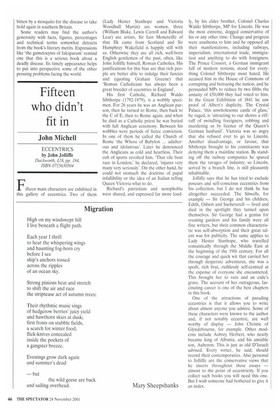Fifteen who didn't fit in
John Michell
ECCENTRICS by John Jolliffe Duckworth, £18, pp. 184, ISBN 0715630504 Fifteen main characters are exhibited in this gallery of eccentrics. Two of them
(Lady Hester Stanhope and Victoria Woodhull Martin) are women, three (William Blake, Lewis Carroll and Edward Lear) are artists, Sir lain Moncreiffe of that Ilk came from Scotland and Sir Humphrey Wakefield is happily still with us. Otherwise they are all rich, well-born English gentlemen of the past, often, like John Jolliffe himself, Roman Catholics. His justifications for this bias are that rich people are better able to indulge their fancies and (quoting Graham Greene) that 'Roman Catholicism has always been a great breeder of eccentrics in England'.
His first Catholic, Richard Waldo Sibthorpe (1792-1879), is a wobbly specimen. For 26 years he was an Anglican parson, then he turned to Rome, then back to the C of E, then to Rome again, and when he died as a Catholic priest he was buried with full Anglican ceremony. Between his wobbles were periods of fierce conviction. In one of them he called the Church of Rome 'the Whore of Babylon ... adulterous and idolatrous'. Later he denounced the Anglicans as cold and heartless. Their cult of sports revolted him. 'That vile boat race in London,' he declared, 'injures very many very seriously'. On the other hand, he could not stomach the doctrine of papal infallibility or the idea of an Italian telling Queen Victoria what to do.
Richard's patriotism and xenophobia were shared, and expressed far more loud
ly, by his elder brother, Colonel Charles Waldo Sibthorpe, MP for Lincoln. He was the most extreme, dogged conservative of his or any other time. Change and progress were anathema to him and he opposed all their manifestations, including railways, imperialism, international trade, immigration and anything to do with foreigners. The Prince Consort, a German immigrant full of modern notions, stood for everything Colonel Sibthorpe most hated. He accused him in the House of Commons of corrupting and betraying the nation, and he persuaded MPs to reduce by two fifths the annuity of £50,000 they had voted to him. In the Great Exhibition of 1841 he saw proof of Albert's duplicity. The Crystal Palace, 'this unwholesome castle of glass,' he raged, is 'attracting to our shores a riffraff of swindling foreigners, robbing and murdering us by licence of the Queen's German husband'. Victoria was so angry that she refused ever to go to Lincoln. Another disadvantage, or favour, that Sibthorpe brought to his constituents was denying them a mainline station. By standing off the railway companies he spared them the ravages of industry; so Lincoln, served by a branch line, is still pleasantly inhabitable.
Jolliffe says that he has tried to exclude poseurs and self-conscious eccentrics from his collection, but I do not think he has altogether succeeded. The Sitwells, for example — Sir George and his children, Edith, Osbert and Sacheverell — lived and died in the spotlight they turned upon themselves. Sir George had a genius for creating gardens and his family were all fine writers, but their common characteristic was self-absorption and their great talent was for publicity. The same applies to Lady Hester Stanhope, who travelled romantically through the Middle East at the beginning of the 19th century. For all the courage and quick wit that carried her through desperate adventures, she was a spoilt, rich brat, ruthlessly self-centred at the expense of everyone she encountered. This brought her to ruin and an exile's grave. The account of her outrageous, fascinating career is one of the best chapters in this book.
One of the attractions of parading eccentrics is that it allows you to write about almost anyone you admire. Some of these characters were known to the author and, if not notably eccentric, are well worthy of display — John Christie of Glyndebourne, for example. Other moderns include Aubrey Herbert, who nearly became king of Albania, and his amiable son, Auberon. This is just as old D'Israeli advised. Every writer, he said, should record their contemporaries. Also personal to Jolliffe are the conservative views that he inserts throughout these essays — almost to the point of eccentricity. If you collect such books you will need this one. But I wish someone had bothered to give it an index.


















































































 Previous page
Previous page